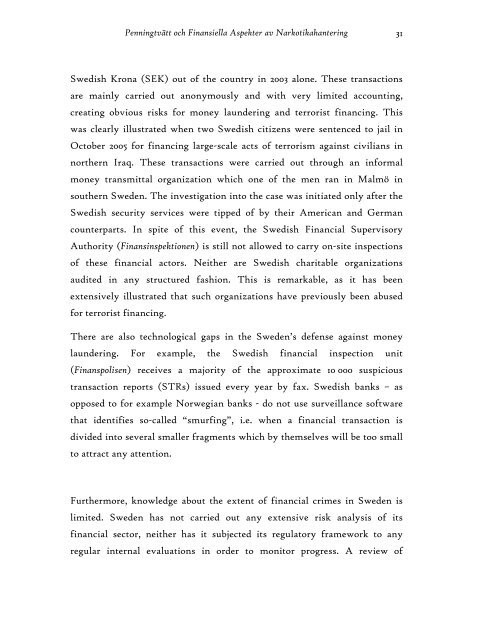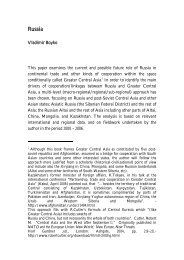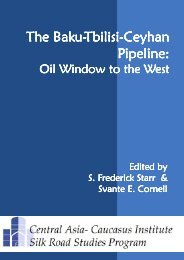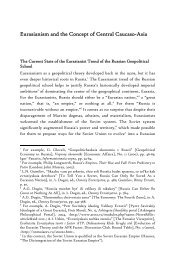Penningtvätt och Finansiell Brottslighet i Östersjöområdet
Penningtvätt och Finansiell Brottslighet i Östersjöområdet
Penningtvätt och Finansiell Brottslighet i Östersjöområdet
You also want an ePaper? Increase the reach of your titles
YUMPU automatically turns print PDFs into web optimized ePapers that Google loves.
<strong>Penningtvätt</strong> <strong>och</strong> <strong>Finansiell</strong>a Aspekter av Narkotikahantering<br />
Swedish Krona (SEK) out of the country in 2003 alone. These transactions<br />
are mainly carried out anonymously and with very limited accounting,<br />
creating obvious risks for money laundering and terrorist financing. This<br />
was clearly illustrated when two Swedish citizens were sentenced to jail in<br />
October 2005 for financing large-scale acts of terrorism against civilians in<br />
northern Iraq. These transactions were carried out through an informal<br />
money transmittal organization which one of the men ran in Malmö in<br />
southern Sweden. The investigation into the case was initiated only after the<br />
Swedish security services were tipped of by their American and German<br />
counterparts. In spite of this event, the Swedish Financial Supervisory<br />
Authority (Finansinspektionen) is still not allowed to carry on-site inspections<br />
of these financial actors. Neither are Swedish charitable organizations<br />
audited in any structured fashion. This is remarkable, as it has been<br />
extensively illustrated that such organizations have previously been abused<br />
for terrorist financing.<br />
There are also technological gaps in the Sweden’s defense against money<br />
laundering. For example, the Swedish financial inspection unit<br />
(Finanspolisen) receives a majority of the approximate 10 000 suspicious<br />
transaction reports (STRs) issued every year by fax. Swedish banks – as<br />
opposed to for example Norwegian banks - do not use surveillance software<br />
that identifies so-called “smurfing”, i.e. when a financial transaction is<br />
divided into several smaller fragments which by themselves will be too small<br />
to attract any attention.<br />
Furthermore, knowledge about the extent of financial crimes in Sweden is<br />
limited. Sweden has not carried out any extensive risk analysis of its<br />
financial sector, neither has it subjected its regulatory framework to any<br />
regular internal evaluations in order to monitor progress. A review of<br />
31






